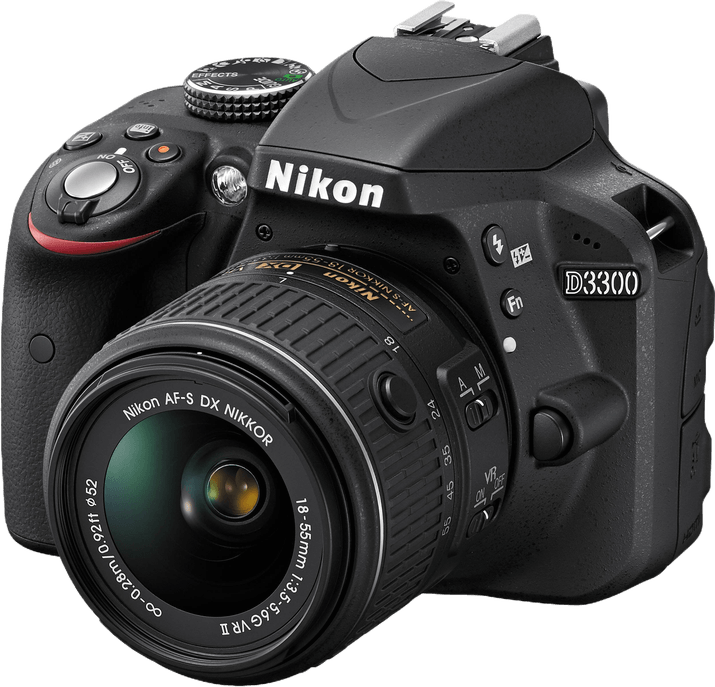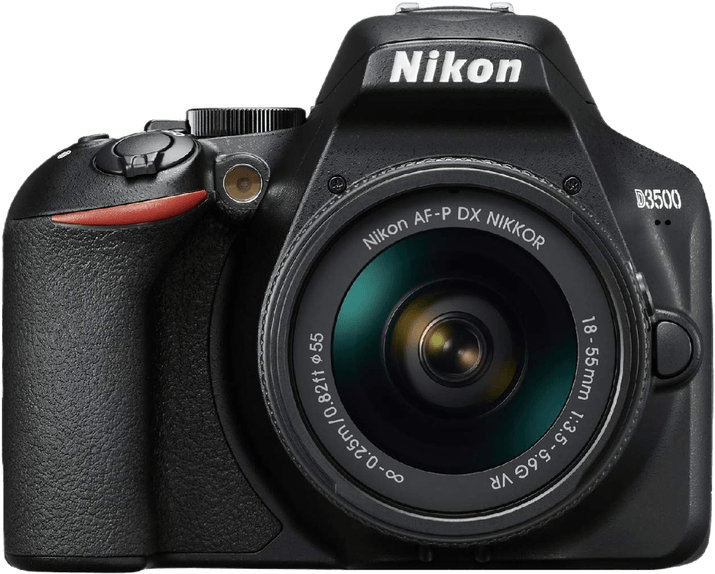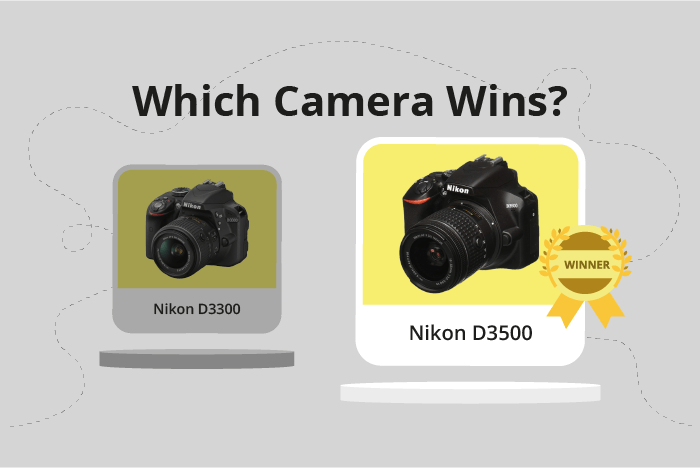Nikon D3300 vs D3500 Comparison
Nikon D3300

Nikon D3500

The Nikon D3500 emerges as the winner with a score of 61/100, while the Nikon D3300 scores 55/100. Both cameras are DSLR types and share similar dimensions, with the D3500 measuring 124 x 97 x 70mm and the D3300 at 124 x 98 x 76mm. Furthermore, they both share the same announcement date and release year, with the D3300 announced on 01/07/2014 and the D3500 on 08/30/2018.
The D3500 outperforms the D3300 with its lower launch price of $499.95 compared to the D3300’s $650. However, the D3300 has a slight advantage in terms of weight, being lighter at 430g compared to the D3500’s 615g.
Taking these factors into account, the Nikon D3500 is a better option due to its lower price and higher score, while the D3300 might be preferred by those seeking a lighter camera.
Nikon D3300 vs D3500 Overview and Optics
The Nikon D3500 emerges as the winner in optics with a score of 65/100, while the Nikon D3300 scores 64/100. Both cameras share several specifications, such as 24 megapixels, a shooting speed of 5, a CMOS sensor type, an Expeed 4 processor, an APS-C sensor size, a Nikon F lens mount, and no image stabilization.
The D3500 outperforms the D3300 in one key aspect: the DXOMARK score for the sensor. The D3500 has a DXOMARK score of 87, which is 5 points higher than the D3300’s score of 82. This means that the D3500’s sensor delivers better image quality, particularly in terms of dynamic range, color depth, and low-light performance.
On the other hand, the D3300 has a slight advantage in terms of megapixels, boasting 24.2 megapixels compared to the D3500’s 24 megapixels. This difference is minimal and may not be noticeable in most shooting situations. However, the extra 0.2 megapixels could provide a slight edge in image resolution and detail for large prints or heavy cropping.
Both cameras have their strengths and weaknesses in optics. The D3500 takes the lead with a better DXOMARK sensor score, resulting in improved image quality. The D3300, although slightly behind, offers marginally higher resolution. Ultimately, the choice between these two cameras comes down to personal preference and specific photographic needs. While the D3500 has a slight edge in optics, the D3300 remains a strong contender in this category.
Nikon D3300 vs D3500 Video Performance
Comparing the video capabilities of the Nikon D3300 and Nikon D3500, both cameras have an equal score of 56/100. This means that these cameras share similar video specifications, with neither of them outperforming the other in this aspect.
Both cameras have a maximum video resolution of Full HD (1920×1080) and can record at a maximum frame rate of 60fps. This ensures that users can capture high-quality videos with smooth motion. Furthermore, neither camera has built-in time-lapse functionality, which means that photographers who are interested in time-lapse photography will need to rely on external tools or software for this purpose.
Despite having the same score, there may be minor differences in video quality between the two cameras due to factors such as sensor performance, image processing, and color reproduction. However, these differences are not significant enough to declare one camera as superior to the other in terms of video capabilities.
As there are no clear advantages in video performance for either the Nikon D3300 or the Nikon D3500, potential buyers should consider other factors such as price, ergonomics, and additional features when deciding which camera to purchase. Both cameras are suitable for users looking for Full HD video recording at 60fps, and the equal score of 56/100 reflects their similar capabilities in this area.
Nikon D3300 vs D3500 Features and Benefits
The Nikon D3500 outperforms the Nikon D3300 with a feature score of 54/100, compared to the D3300’s 41/100. Both cameras share several specifications, such as a 3-inch screen size and lack of touchscreen, flip screen, GPS, and WIFI capabilities.
The D3500’s superiority stems from its slightly higher screen resolution, at 921,600 dots compared to the D3300’s 921,000 dots. This difference results in a marginally clearer and sharper display for the D3500. The most significant advantage of the D3500 over the D3300 is its Bluetooth connectivity, allowing for easier file transfer and remote control of the camera.
In contrast, the D3300 does not surpass the D3500 in any specific feature. Both cameras have identical screen sizes and lack several functions, making the D3300 a less appealing option compared to the D3500.
Considering the feature scores and specifications, the Nikon D3500 is the superior camera due to its marginally better screen resolution and Bluetooth connectivity. The Nikon D3300 does not offer any advantages over the D3500, making it a less attractive option for potential buyers.
Nikon D3300 vs D3500 Storage and Battery
The Nikon D3500 outperforms the Nikon D3300 in storage and battery with a score of 48/100, while the D3300 receives a score of 32/100. Both cameras have one memory card slot, accepting SD, SDHC, and SDXC cards. They also share the same battery type, the EN-EL14a, but neither offers USB charging.
The D3500 excels with its battery life, providing 1550 shots per charge, significantly more than the D3300’s 700 shots. This advantage allows users to capture more images without worrying about battery depletion.
The D3300 does not have any specific advantages in storage and battery compared to the D3500. Its lower score reflects its shorter battery life, which may limit its usability in extended shooting sessions.
Considering the storage and battery aspects, the Nikon D3500 is the superior choice due to its longer battery life, while both cameras share similar storage capabilities.
Alternatives to the Nikon D3300 and D3500
Are you still undecided about which camera is right for you? Have a look at these popular comparisons that feature the Nikon D3300 or the Nikon D3500:

